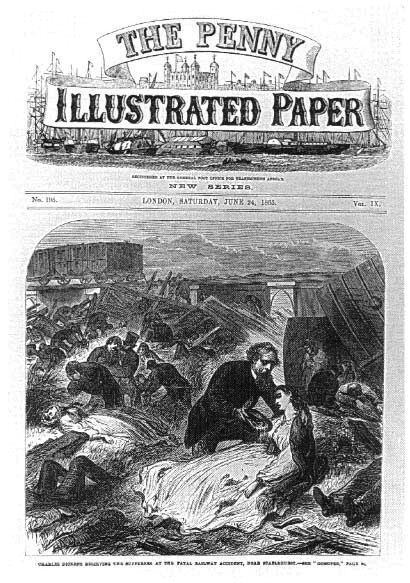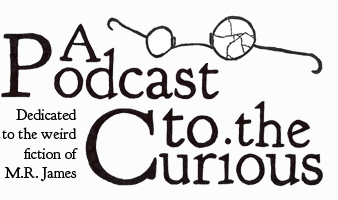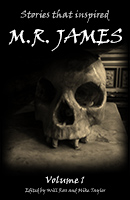 We’re back! This week Mike and Will descend gingerly into a gloomy railway cutting to investigate Charles Dickens’ The Signal-Man. Dickens dissects the harsh realities of life in industrial Britain, but can he also deliver a pleasing terror and a locomotive-sized Jamesian Wallop? (spoiler: yes, in spades)
We’re back! This week Mike and Will descend gingerly into a gloomy railway cutting to investigate Charles Dickens’ The Signal-Man. Dickens dissects the harsh realities of life in industrial Britain, but can he also deliver a pleasing terror and a locomotive-sized Jamesian Wallop? (spoiler: yes, in spades)
Show notes:
- Higham Station was the closest to Dickens’ home at Gads Hill Place and he’d have had plenty of time to contemplate it’s formidable tunnel.
- Fatal crashes and accidents were by no means rare in the early days of the railways. Dickens was himself involved in a hideous rail crash while in the company of his mistress and her mother, as memorialised in the picture above. Mike mentioned hearing about the Thirsk rail disaster on the excellent podcast Note to Self – he didn’t, but admits it was actually on a lecture about sleep on BBC Radio 3.
- An approachable essay on Dickens and the Trauma of Technology, which covers some of the main themes of the story.
- Oldstyle Tales Press have released a wonderful edition of Dickens’ ghost stories with great footnotes and illustrations (disclaimer – we were kindly sent a couple of free copies by the lovely editor, Michael Grant Kellermeyer).
- Another slim edition worth getting hold of is by Profile Books, which includes the incredibly funny story The Boy At Mugby Junction – I would like to say that railway catering has improved in the UK, but it’s only by degrees.
- And of course, please check out the BFI Ghost Story for Christmas DVD, including LGC’s dramatisation of the Signal-Man.
- Huge thanks to our reader this week, Mike’s very own father in law… Mike. Yes, it gets confusing.
Finally, a huge apology from me (Mike) for the delay in getting this out – we ain’t dead yet!
Podcast: Play in new window | Download
Subscribe: RSS
Tags: Charles Dickens, Signal-man








There is another cutting halfway along Higham tunnel – it was originally a canal tunnel and the gap was dug as a passing place for barges.
The cutting there is very dark and deep. I wonder if that was the one Dickens had in mind? He would have known it.
Link to Geograph page: http://www.geograph.org.uk/photo/1612919
Great to have another podcast from you lads-like many others a great discussion. The story is quite melancholic and agree with its very modern relevance today. Denholm Elliot’s a great actor in the TV adaption but in his uniform reminded me of his butler in Trading Places! One other thing:easy on the James!
So glad you’re back! Dickens’ use of the future-ghost reminds me of Nigel Kneale’s The Road, in which an 18th century village is haunted by ghosts from a 20th century nuclear war.
Moving away from ghost stories, but staying with railway accidents, anyone with a morbid interest in them should find a copy of L T C Rolt’s ‘Red For Danger’.
Rolt also wrote a collection of rather Jamesian (sometimes with a nod to Machen) ghost stories titled ‘Sleep No More’ 🙂
It was reading Rolt at an early age that left me with a shudder whenever I hear the word “Quintinshill”. (Relevant as an example of gross negligence by signalmen nearly fifty years after this story – at least according to the findings at the time, though a BBC investigation in 2015 was determined to clear them.)
Quintinshill – the worst accident ever on the railways in Britain. Unfortunately, despite the misguided attempt to exonerate the signalmen involved, both were indeed culpable. No government conspiracy. Just a simple failure to use reminder appliances which would have prevented the clearing of signals and so avoided the disaster ever happening.
Glad to see you guys back again, these breaks are killer, but the episodes are worth it.
I’m not sure I agree with you lads on the issue of relatability, though. I agree in a broad general sense after some thought, but I still find it hard to reconcile the impact of the railways with the impact of the Internet, just because they’re such radically different things with such radically different concerns. No one’s afraid of being vaporized or going insane from high broadband speeds. Well, maybe the latter, just a little.
I will argue, though, that any M.R. James story can be ‘person goes on holiday to the beach, stumbles over old ruin and takes a little souvenir, gets haunted’. The scholarly and clerical origins of James’ characters are certainly a distinct flavour, and lend them their identity, but they aren’t all important (most of the time). James could have written his stories about anyone and have been just as effective, he just wrote about what he liked and what his audience would know. I dunno, I feel like on the one hand it’s sort of hard to relate to a monstrous haunting by crusading bedsheets, but at the same time, I don’t think their settings (most of them) or characters make them hard to be relatable. After all, one of the hallmarks of a great horror story is relatability in some way, verisimilitude, there has to be some sense of grounded reality to latch on to for the horror to work for the reader. Horror takes place in our world.
I’ve always found “The Signal-Man” a singularly portentous and creepy tale. I like the fact that it provides only a partial solution at the end of the story. I had the pleasure of seeing a interesting stage adaptation in November 2015, starring Jack Shepherd.
Tangentially, there is an episode of the Gerry Anderson sci-fi show, Space 1999, that has a similar plot to “The Signal-Man”. “The Troubled Spirit” follows in a similar vein and even today is still grim and disturbing.
https://en.wikipedia.org/wiki/The_Troubled_Spirit
I saw that adaptation with Jack Shepard too. It was a ‘double feature’ with “Oh Whistle…”.
Both very well staged I thought.
Wonderful, info-packed episode, well worth waiting for!
So, you two have now got round to “The Signalman” by Charles Dickens. Being a signalman, I can tell you that Dickens did a superb job with this. An isolated country signalbox at night is an ideal place to conjure up the supernatural, even if we no longer (except on the preserved lines) have the telegraph poles and the singing wires. And there are many, allegedly, true ghost stories to be told concerning Britain’s past and surviving railway network.
The railway accident in which Dickens was nearly killed took place at Staplehurst, Kent in June 1865. He and his relatives were on the boat train from Folkestone, the running of which depended on the tides in the Channel. Relaying of the track, involving removal and replacement of rails had been taking place and the track foreman misread his schedule, assuming that no train was due when, unfortunately, one was. It is said that Dickens never really recovered from the accident and what he saw.
The excellent BBC version of “The Signalman” was filmed on the Severn Valley Railway in, I think, 1976. However the location of the ‘box in that is a composite, in that while the signal box used is real enough, it isn’t situated near a tunnel. Camera trickery at its finest.
Chaps, this is nothing to do with The Signalman, but I just want to say that I got the Michael Cox Monty biography (from the Wandsworth library service) and good lord isn’t Arthur Benson a bitch!
Well done for getting hold of it! Some nefarious individual (er, me) had the Wandsworth library copy for quite a while a couple of years ago. Fines would’ve paid for a second hand copy…
And yes, he was a pretty blunt diarist. Almost like James’ brash alter ego!
I have rejoined the podcast at a great time with The Signalman in time to listen on Halloween walking home in the post-clocks back early darkness. Some really good ideas on lured to death, suicide, etc, and the use of a Denholm Elliott death mask on the figure at the mouth of the tunnel has never resolved the ambiguity of the ending in the brilliant TV version.
I like the anecdote about LGC feeling that further MRJ adaptations would be expensive by 1976! I can’t believe that he didn’t know how much promise his story had for TV. You’re right, the story is right up there with the best half dozen MRJ stories.
One further change of story to TV unmentioned was the lady in wedding dress falling from the train (or jumping/pushed as jilted bride/forced marriage) versus a simple – and as you mentioned blander death in carriage. An improved televisual change.
The father-in-law narrator did a great job by the way. There were moments when he sounded and read like Robert Lloyd Parry, which is praise indeed.
I have recently found your podcast and been steadily making my way through it over the past few weeks (such a joy to have so much content to catch up on!) I have loved the episodes and agreed and disagreed with what you’ve said but never felt the need to comment but I just wanted to say that in the last part of this reading when he shouted “below there!” I totally had shiver down my spine! I loved it and hope you will too.
P.S I have found myself buying loads of books recently again which is entirely your fault!